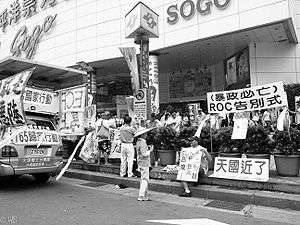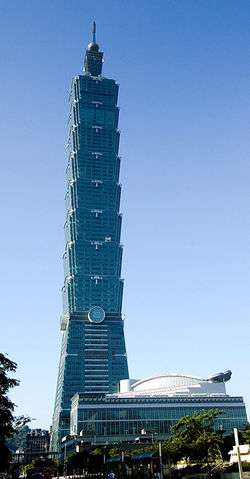Economic Cooperation Framework Agreement
| Economic Cooperation Framework Agreement | |||||||||||
| Traditional Chinese | 兩岸經濟合作架構協議(定) | ||||||||||
|---|---|---|---|---|---|---|---|---|---|---|---|
| Simplified Chinese | 两岸经济合作架构协议(定) | ||||||||||
| |||||||||||
| Alternative Chinese name | |||||||||||
| Traditional Chinese | 兩岸經濟協議(定) | ||||||||||
| Simplified Chinese | 两岸经济协议(定) | ||||||||||
| |||||||||||
The Economic Cooperation Framework Agreement (ECFA) is a preferential trade agreement between the governments of the People's Republic of China (mainland China) and the Republic of China (Taiwan) that aims to reduce tariffs and commercial barriers between the two sides. The pact, signed on June 29, 2010, in Chongqing,[1][2] was seen as the most significant agreement since the two sides split after the Chinese Civil War in 1949.[3] It will boost the current US$197.28 billion bilateral trade between both sides.[4]
Background
The government of the People's Republic of China uses its influence on neighboring economic powers to prevent them from signing free-trade agreements (FTAs) with Taiwan.[5][6] Instead, under the leadership of the Kuomintang, Taipei was motivated to sign the ECFA with mainland China partly in hope that once it has this agreement the PRC will stop pressuring other countries to avoid such agreements with Taiwan, as well as to counteract the negative consequences of China's free trade agreement with ASEAN.[7] The ECFA has been compared with the Closer Economic Partnership Arrangements mainland China signed with the Special Administrative Regions: Hong Kong and Macau.[8]
The deal is thought to be structured to benefit Taiwan far more than mainland China. The "early harvest" list of tariff concessions covers 539 Taiwanese products and 267 mainland Chinese goods. The advantage to Taiwan would amount to US$13.8 billion, while mainland China would receive benefits estimated at US$2.86 billion.[9] Mainland China will also open markets in 11 service sectors such as banking, securities, insurance, hospitals and accounting, while Taiwan agreed to offer wider access in seven areas, including banking and movies.[10]
Financial reforms were kicked off on January 16, 2010 with the signing of three Memoranda of Understanding between Taiwan's Financial Supervisory Commission Chairman Sean Chen and three counterpart agencies in Beijing for Banking, Insurance and Securities. The FSC is hoping that Taiwan will get more leniency in the hurdles set by the Chinese government for foreign players. These hurdles have limited the growth of these foreign players relative to their local peers.[11]
Signing and review
The negotiation process took place over several rounds. Substantive yet informal discussions regarding the ECFA initially took place during the 4th round of SEF-ARATS discussions in December 2009. During this time the delegates for China and Taiwan laid down the framework for the first round of ECFA talks[12] which took place on January 26, 2010 in Beijing. Kao Koong-lian, secretary general and vice chairman of the Straits Exchange Foundation (SEF), led the 13 member Taiwanese delegation while Zheng Lizhong, Vice President of the Association for Relations Across the Taiwan Straits (ARATS), represented China's interests.[13] Subsequent rounds of ECFA talks took place on March 31, 2010 in Taipei and June 13, 2010 in Beijing.[13][14] The final agreement was signed during the 5th round of SEF-ARATS talks on June 29, 2010 in Chongqing.[1][15] Chiang Pin-kung, the chairman of Taiwan's SEF represented Taiwan.[16][17] Chen Yunlin, the President of ARATS, represented mainland China.[1][18] Taiwan's Executive Yuan approved the ECFA on July 2, 2010[19] and the Legislative Yuan (parliament) approved the deal on August 17, meaning the deal became law on January 1, 2011.[20] The ECFA came into effect on September 12, 2010.[21][22]
Issues
Debate
There is currently much controversy in Taiwan over the ECFA, including over potential effects on local Taiwanese businesses,[23] as well as on how the government has presented it to the public. The opposition Democratic Progressive Party (DPP) and other pro independence groups believe the ECFA is a cover for unification with China. It neither accord the same rights as a Free Trade Agreement which will reduce manufacturing jobs and average salary, nor accelerate capital outflow and brain drain of management and technology expertise.[24] The opponents of the ECFA also indicated concerns about allowing the influx of mainland Chinese white-collar workers or professionals to work in Taiwan which could put the job security of locals at risk.[25] According to Jie Huang of China Review, it is a means to maintain peace in cross-Strait relations and "ultimately to reach the goal of reunification."[7] A debate was held and televised on April 25, 2010.
Protest

Tens of thousands of people turned to the streets to protest against the signing of the ECFA which would boost two-way trade organized by the Democratic Progressive Party-led Sunflower Student Movement.[26] A spokesman for the DPP said the trade agreement with China will damage the local economy and undermine Taiwan's sovereignty as he was against the One China market concept.[27] President Ma Ying-jeou responded that the signing would not lead to a One China market.[28]
Many protesters fear the agreement will eventually lead Taiwan to the unification with mainland China.[29] The protest originally estimated a turnout of 100,000 people.[30] The DPP said 100,000 took part in the protest, while the police said there were 32,000 people.[26] The demonstration started at 3pm and dismissed by 7pm.[27]
Clash in the legislature
On July 8, 2010 a Legislative Yuan meeting was held. The DPP insisted the ECFA agreement be reviewed article by article. That demand was rejected by the KMT caucus.[31] A six-minute fight then broke out among the legislators. Wang Jin-pyng was at the podium surrounded by other KMT legislators. Liu Chien-kuo (劉建國), Chen-ching (蘇震清) and Kuo Wen-chen (郭玟成) attempted to get to him and failed. Lawmakers threw paper, water and trash at each other. KMT legislator Wu Yu-sheng (吳育昇) was hit in the head by a clock. He had to be transported to National Taiwan University Hospital.[31][32] A number of other people were involved in the scuffle. Two KMT legislators held DPP chairwoman Tsai Ing-wen responsible for the clash.[31]
See also
- Cross-Strait relations
- Cross-Strait Service Trade Agreement
- Political status of Taiwan
- Mainland and Hong Kong Closer Economic Partnership Arrangement (CEPA)
- Mainland and Macau Closer Economic Partnership Arrangement (CEPA)
References
- 1 2 3 "Chinese mainland, Taiwan sign landmark economic pact". News.xinhuanet.com. 2010-06-24. Retrieved 2010-06-29.
- ↑ Taiwan News, ECFA signing scheduled for June 29 June 25, 2010
- ↑ Chris Hogg (2010-06-29). "Taiwan and China sign landmark trade agreement". BBC News. Retrieved 2010-06-29.
- ↑ http://focustaiwan.tw/news/aeco/201401100017.aspx
- ↑ Taipei Times 2009/09/12
- ↑ Taipei Times 2009/09/25
- 1 2 Huang, Jie (Fall 2012). "TPP versus ECFA: Similarities, Differences, and China's Strategies". China Review (Chinese University Press) 12 (2): 87. Retrieved 1 May 2015 – via JSTOR. (registration required (help)).
- ↑ Sina.com, (2010), 陸學者:ECFA與CEPA提升競爭力, 2010-07-10 (Chinese)
- ↑ "ECFA signing scheduled for June 29 - Taiwan News Online". Etaiwannews.com. 2010-06-25. Retrieved 2010-06-29.
- ↑ "China Pulls Taiwan Closer With Historic Trade Deal (Update1)". BusinessWeek. 2009-12-08. Retrieved 2010-06-29.
- ↑ Financial Reforms Open China to the Taiwanese, by Sam Radwan, Bloomberg Businessweek, Jan 2010
- ↑ Chinapost.com, (2009), 2009-11-18
- 1 2 Chinapost.com, (2010), 2010/01/25
- ↑ Ciaonet.org, (2010), , 2010-03-29
- ↑ "Taiwan services to face onslaught from China after ECFA: DPP Government denies Chinese white-collar workers coming". Etaiwannews.com. 2010-04-06. Retrieved 2010-07-01.
- ↑ China Daily, (Xinhua) SEF chairman sets goal to sign ECFA by June, 2010-04-03
- ↑ "Taiwanese businesses in China will not be able to use 'MIT': MAC". Focustaiwan.tw. Retrieved 2010-07-01.
- ↑ "focustaiwan". Focustaiwan.tw. Retrieved 2010-07-01.
- ↑ Chinapost.com.tw. "Chinapost.com.tw." ECFA sent for second reading. Retrieved on 2010-07-10.
- ↑ bbc.co.uk."." Taiwan-China trade deal passed by Taipei legislators. Retrieved on 2010-08-18.
- ↑ "UPDATE: Taiwan, China Trade Pact To Become Effective Sunday". The Wall Street Journal. 2010-09-11.
- ↑ bbc.co.uk, (2010), Historic Taiwan-China trade deal takes effect, 2010-09-12
- ↑ Taipei Times 2009/07/31
- ↑ "etaiwannews Editorial". Etaiwannews.com. 2009-10-06. Retrieved 2010-07-01.
- ↑ "focustaiwan". Focustaiwan.tw. Retrieved 2010-07-01.
- 1 2 Vancouversun.com. "Vancouversun.com." Thousands protest in Taiwan against China trade deal. Retrieved on 2010-06-26.
- 1 2 Businessweek.com. "Businessweek.com." Taiwan Opposition Holds Rally to Protest China Trade. Retrieved on 2010-06-26.
- ↑ Taipeitimes.com. "Taipeitimes.com." APPROACHING ECFA: President says ECFA won’t bring ‘one China market’. Retrieved on 2010-06-26.
- ↑ LAtimes.com. "LAtimes.com." Taiwan trade pact with China fires up protesters. Retrieved on 2010-06-26.
- ↑ Chinareviewnews.com. "Chinareviewnews.com." 626遊行真的擠爆凱道. Retrieved on 2010-06-26.
- 1 2 3 Taipeitimes.com. "Taipeitimes.com." Legislators brawl over ECFA review. Retrieved on 2010-07-10.
- ↑ etaiwannews.com. "etaiwannews.com." Taiwan legislature clashes mark start of ECFA review. Retrieved on 2010-07-10.
External links
| Wikisource has original text related to this article: |
- English translation of the Economic Cooperation Framework Agreement Ministry of Economic Affairs, Republic of China
- Taiwan Affairs Office of the State Council
- Straits Exchange Foundation
| ||||||||||||||||||||||||||
| |||||||||||||||||||||||||||||||||||||||||||||
